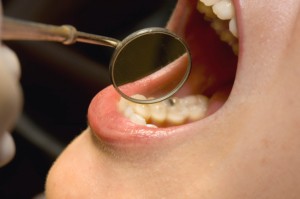 Ever heard the old saying “we’re all in this together?” It applies just as much to your teeth as to your favorite sports team. Even a single missing tooth can expose the surrounding teeth to damage and eventual loss. That’s why your family dentist in Massapequa recommends root canals rather than extractions whenever possible. This post will cover what you need to know about this gentle, effective form of treatment.
Ever heard the old saying “we’re all in this together?” It applies just as much to your teeth as to your favorite sports team. Even a single missing tooth can expose the surrounding teeth to damage and eventual loss. That’s why your family dentist in Massapequa recommends root canals rather than extractions whenever possible. This post will cover what you need to know about this gentle, effective form of treatment.
What Is a Root Canal?
If you were to look at a diagram of a normal tooth, you would see a system of nerve canals at its base. These look very much like typical plant roots. They’re responsible for conveying blood and nerve signals to and from the tooth.
When cavity-causing bacteria invades a tooth, it usually works its way from the top down. Along the way the patient becomes more and more uncomfortable. By the time the infection reaches the roots, the pain can be excruciating.
Left untreated, these malicious microorganisms will spread through the roots, destroying the healthy tissues within and attacking the bones in your face. The only way to stop this threat is to remove the infection altogether.
Your dentist may choose one of two methods to accomplish this: extraction or root canal. An extraction removes the distressed tooth, root and all, leaving a hollow space behind. While this may seem like the simpler and better approach, in most cases it’s not. Here’s why:
- Even a single missing tooth can subject those that remain to unhealthy bilateral stress, eventually causing them to fail as well.
- The gap left behind after an extraction is the ideal breeding ground for bacteria. It’s dark, moist, and out-of-the-way. This sets the stage for additional cavities to form over time.
For these reasons, most dentists recommend root canals over extractions. Here’s how a root canal works:
- Your dentist numbs the nerves around the affected area with anesthetic. He or she then begins to remove the infected tissue in the tooth, all the way down to the roots themselves.
- Once this is complete, the next step is to apply an antiseptic solution to the inside of the tooth. This kills any germs that may have been left behind.
- The final step is to fill the cavity. This is done to guard against future infection and enable the patient to regain full use of the tooth.
“But Don’t Most Root Canals Fail?”
This is a common misconception about root canal therapy. It may have had some basis in truth years ago. Fortunately, modern dental science has made these fears obsolete. Today’s root canals are successful in the overwhelming majority of cases. Not only that, but the discomfort associated with a root canal is minimal; most patients compare it to undergoing a simple extraction. Yet the benefits of a root canal can last a lifetime.
Your dentist will probably recommend a soft food diet for the first few days after your root canal. He or she may also suggest using an over-the-counter pain reliever such as ibuprofen to manage any discomfort you may feel. You should brush with care and avoid sweets and alcoholic beverages.
Keeping the tooth healthy over the long term requires only the same basic care you give to all of your teeth. This includes daily brushing and flossing, eating a sensible diet, and seeing your dentist for exams and cleanings.
Has your dentist in Massapequa told you that a crown or extraction is the only way to treat your aching tooth? There’s no harm in seeking a second opinion. You may find that a root canal is the best option for you. Whatever you decide, we wish you lots of happy smiles in the years to come.
About the Author
Dr. Dory Stutman has been practicing dentistry for almost 30 years. He earned his DDS degree from Case Western Reserve University’s school of dental studies and is a proud member of the American Dental Association (ADA). You can reach his office online or by calling (516) 798-3808.
